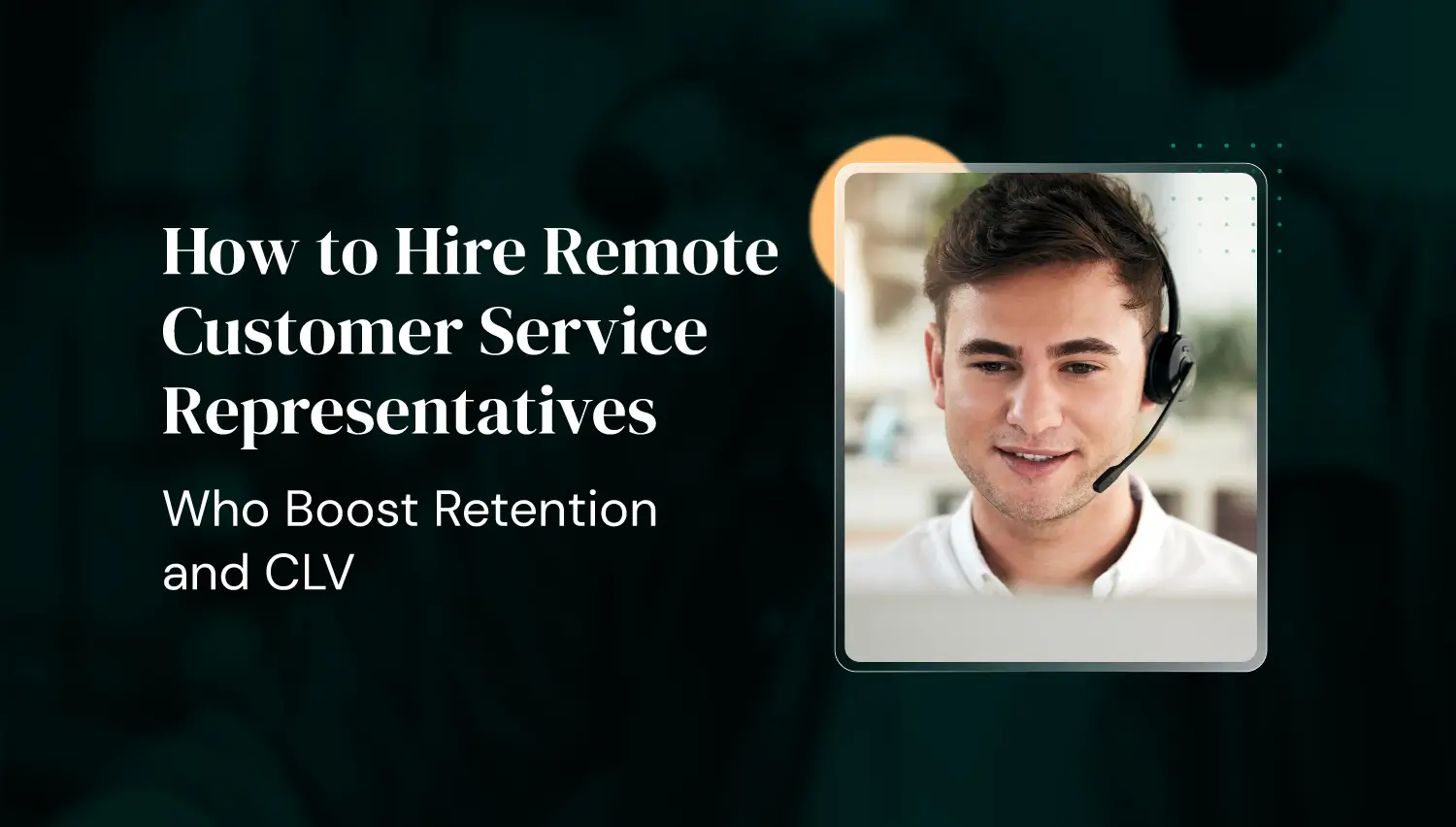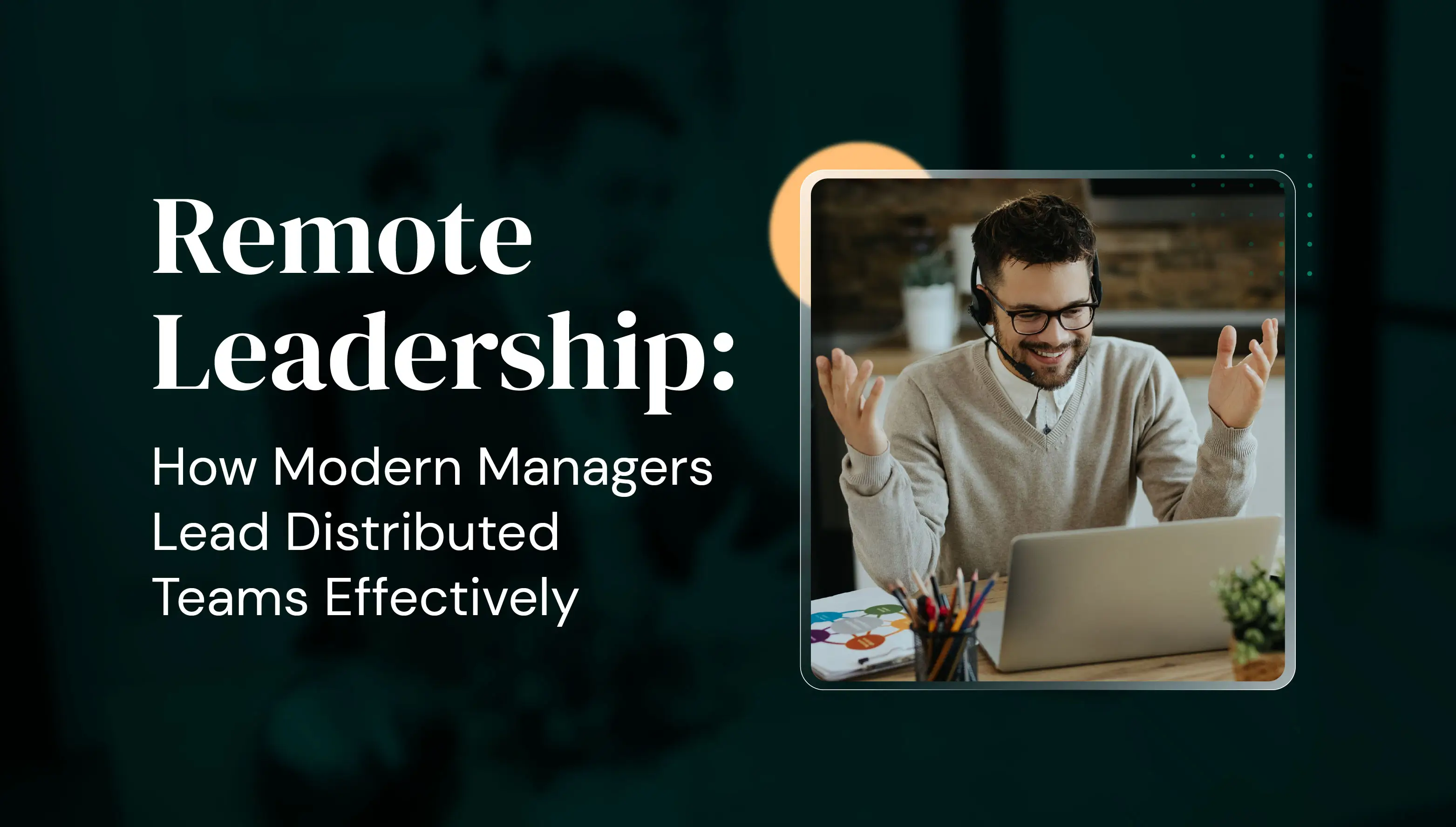Some time ago, I was working with a subscription-based wellness platform that was dealing with a sudden spike in churn. Their product was strong. Their marketing pipeline was healthy. But the moment I dug into their cancellation notes and NPS comments, the pattern was obvious: customers were leaving because support felt slow, transactional, and disjointed across time zones, not because of the product.
One incident stuck with me. A long-time customer had reached out three times about a billing discrepancy that should’ve taken minutes to resolve. Instead, each reply came from a different agent, none of whom had context, and the customer gave up, cancelling a plan worth nearly $2,000 a year. When we finally rebuilt their support team with remote reps trained in full-lifecycle ownership (instead of ticket-by-ticket triage), churn dropped nearly 12% in a single quarter.
Great customer service really comes down to this: the people who show up in a customer’s most frustrated moments determine whether that customer stays or walks. When you hire remote customer service representatives who understand that, you’re building a revenue-protecting layer around your business.
What Great Remote Customer Service Reps Actually Do to Protect Revenue
Deliver Fast, Context-Rich Support Across Channels
Remote customer service reps who move the needle aren’t just “answering tickets.” They’re reducing friction in every interaction. That means:
- Handling email, chat, and voice with the same level of clarity and ownership
- Pulling context from CRM, product logs, or previous conversations before responding
- Reducing back-and-forth by anticipating the next question a customer will ask
- Escalating early when an issue threatens revenue, not waiting for a ticket to age
Speed matters, but relevance matters more. Customers want someone who understands their history.
Resolve Issues Fully Without Passing Customers Around
One of the biggest differentiators between high-performing reps and average ones is full-cycle ownership. These reps:
- Diagnose the root cause of an issue instead of patching symptoms
- Coordinate with billing, product, or engineering without forcing customers to repeat themselves
- Close the loop with clear, confident resolution instead of vague “we’re checking on this” replies
- Document what happened so the next agent (and the customer) benefits from the fix
This is how you turn a negative experience into trust, and trust into retention.
Proactively Identify Churn Signals
A strong remote rep becomes your earliest warning system for customer dissatisfaction. They’re trained to spot:
- Repeated complaints or usability issues
- Customers asking questions that suggest they’re close to cancelling
- Silent indicators like long pauses in usage or confusion about value
- Common friction points that should be escalated to product or leadership
Guide Customers Toward Better Use of the Product
Retention almost always improves when customers get more value from what they’re paying for. High-performing CSRs:
- Offer quick walkthroughs or screen shares that unlock features customers aren’t using
- Recommend plans or workflows based on real use cases
- Share tips, best practices, or resources that help customers get the outcome they bought the product for
- Push product feedback upstream so the customer experience keeps improving
Communicate Clearly and Calmly Under Pressure
Remote reps don’t benefit from office-level oversight or real-time coaching, so communication skills have to be unusually strong. You’re looking for people who can:
- Defuse tension with tone, not just solutions
- Explain complex technical steps without condescension or jargon
- Maintain consistency across asynchronous communication (email, chat)
- Set expectations, customers trust, and then meet them
.webp)
Capture and Translate Customer Insights
The best remote reps act as a bridge between the customer and the business. Their responsibilities often include:
- Tagging issues accurately so teams can see patterns emerge in real time
- Logging feedback that helps product teams prioritize roadmap decisions
- Sharing customer sentiment trends that help marketing or sales adjust messaging
- Highlighting opportunities for expansion or upsell only when they genuinely fit customer needs
Maintain Operational Excellence in a Remote Environment
Remote customer service only works when reps are disciplined about their workflows. You want people who can:
- Manage queues independently without losing track of SLAs
- Use internal tools (CRM, help desk, comms platforms) cleanly and consistently
- Document processes so anyone on the team can step in
- Work reliably across time zones, hand off cases smoothly, and collaborate asynchronously
The Skills and Traits That Predict High-Impact Remote Support Performance
Strong Ownership Mindset That Goes Beyond Ticket Handling
When I’m building a remote support team, I look for people who treat every customer interaction like a problem to own, not a task to clear. Ownership shows up in how candidates talk about past roles. Did they:
- Take initiative to solve issues end-to-end?
- Follow up without being asked?
- Spot patterns and propose improvements?
- Step in when something fell between team responsibilities?
This mindset is the single biggest predictor of whether a rep will meaningfully improve retention and CLV.
High Empathy Paired with Operational Precision
Empathy alone doesn’t drive retention. Pairing empathy with accuracy does. The best reps:
- Read a customer’s emotional state fast
- Choose the right tone for the moment
- Stay calm when a customer escalates
- Provide clear, correct instructions without over-apologizing or overcomplicating
You’re looking for candidates who can diffuse emotion and execute flawlessly under pressure.
Crisp, Asynchronous Communication Skills
Remote environments rely heavily on written clarity. That means hiring people who can:
- Write concise, friendly, technically accurate replies
- Ask clarifying questions that speed up, not slow down, the solution
- Document internal notes that another rep can quickly understand
- Maintain consistency across different channels (chat, email, SMS, in-app messages)
Pattern Recognition and Light Technical Fluency
Retention drops when teams treat recurring issues like one-off problems. High-performing reps can identify patterns emerging from customer complaints. Even when they’re not engineers, they can:
- Distinguish between user error and a real product bug
- Reproduce issues before escalating
- Explain the problem to technical teams clearly
- Understand how different parts of the system interact
This is especially important in SaaS, fintech, and mobile-product environments where the line between “support” and “technical troubleshooting” is thin.
Structured Problem-Solving in Fast-Moving Environments
Top remote support reps don’t guess. They follow a repeatable, logical approach:
- Diagnose: Isolate variables, ask the right questions
- Verify: Test assumptions before replying
- Resolve: Provide the simplest solution first
- Prevent: Surface underlying issues to reduce repeat tickets
This reduces resolution times and minimizes customer frustration.
Reliability and Autonomy in Dispersed Teams
Remote teams live and die by consistency. You need reps who show:
- Disciplined time management
- Quiet, predictable daily output
- Ability to hit SLAs without hand-holding
- Comfort making decisions without a manager watching
- Healthy communication when they’re stuck or overloaded
A Customer-Centric View of Business Metrics
This is where top reps stand out. They understand that retention and CLV are the outcome of daily interactions, not abstract KPIs. I look for candidates who know how their work influences:
- Churn risk
- Feature adoption
- Support-driven upsell opportunities
- Repeat purchase behavior
- Net promoter score (NPS)
- Customer sentiment and escalation trends
.webp)
Common Hiring Mistakes That Undermine Customer Retention and CLV
Hiring for Personality Instead of Capability
A friendly demeanor is valuable, but it’s not a stand-in for the judgment, clarity, and technical fluency required to keep customers from churning. Teams that prioritize likeability often hire reps who avoid hard conversations, misdiagnose issues, or escalate too quickly. Customers may enjoy the tone, but they won’t stay if the experience doesn’t solve their problem.
Misunderstanding the Real Demands of Remote Support
Many roles are scoped and advertised as if support were simple, transactional work. That attracts candidates who expect script-driven environments rather than complex, full-ownership roles. The result is mis-hires who can’t navigate product nuances, handle emotionally charged situations, or operate autonomously. In remote settings, this is amplified. Weak writers, disorganized workflows, and inconsistent availability all translate directly into slower resolutions and frustrated customers.
Undervaluing Technical and Analytical Skills
Teams often assume support isn’t technical, which leads to hiring reps who struggle to reproduce issues, reason through systems, or communicate clearly with product teams. When support can’t pinpoint causes or articulate what’s happening behind the scenes, customers lose confidence long before they officially cancel. Strong retention depends on reps who can troubleshoot effectively and spot patterns early.
Using Vague Job Descriptions and Over-Reliance on Volume Experience
Generic job posts bring in candidates who expect narrow responsibilities, not the depth of ownership required to influence CLV. Similarly, hiring solely from high-volume call centers can backfire; speed and script-following don’t necessarily translate into the kind of contextual problem-solving needed in subscription or product-driven businesses. Without clear expectations and the right screening signals, your pipeline fills with candidates who aren’t equipped to protect revenue.
Failing to Screen for Retention Skills
Most interviews focus on politeness, basic accuracy, or hypothetical troubleshooting. But retention hinges on something different: the ability to guide customers through doubt, prevent repeated issues, and reframe value under pressure. When those skills aren’t assessed, the hire may be perfectly pleasant, but unable to keep accounts from slipping away.
Turning Customer Support Into a Retention Advantage
Hiring remote customer service representatives who bring ownership, sound judgment, and steady communication protects revenue. The right people defuse tension, prevent repeat issues, and turn risky moments into renewed trust, all while giving you broader time-zone coverage without added overhead.
The harder part is finding talent who can do this consistently. Retention-driving support hires don’t come from generic job boards. You need a partner who understands what high-impact support looks like and can surface candidates who elevate every interaction. That’s where Somewhere comes in: we specialize in remote support professionals who strengthen relationships and influence CLV, not just ticket volume.
If you’re ready to build a remote support function that actually improves retention, fill out the contact form below, and we’ll connect you with remote representatives who make customers want to stay.






.avif)
.jpeg)






.jpeg)